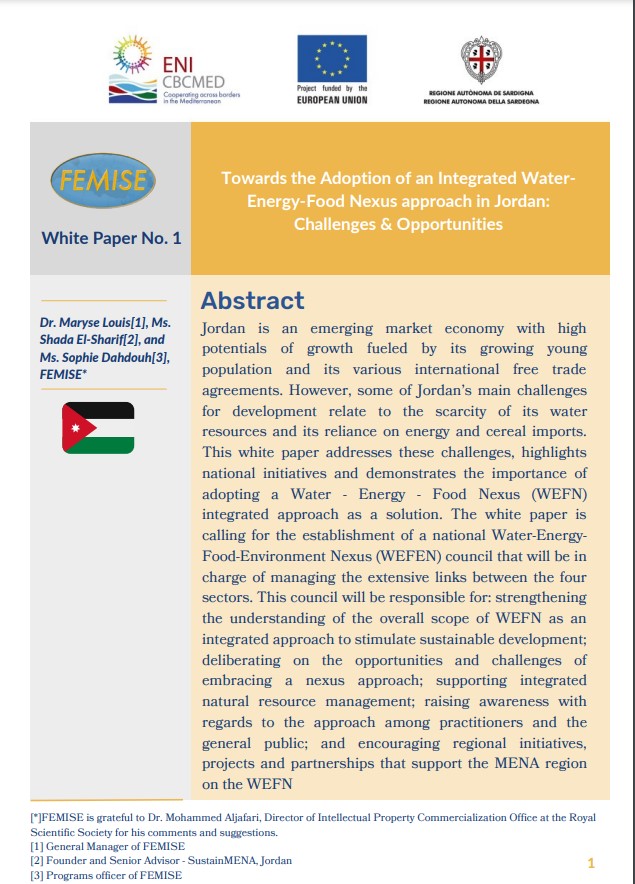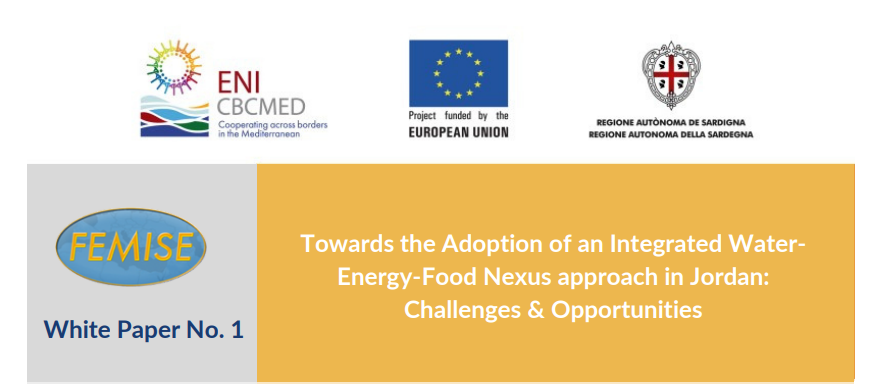Water, energy and food are essential resources for human survival and economic development. Jordan is among the most dependent countries in the world on foreign energy sources and has to struggle with a stark water scarcity, being one of the water poorest countries in the world. In addition to poor water resources for irrigation and limited agricultural land, an appraisal of food security in the country also reveals its vulnerability.
Despite these challenges, the Jordanian government is clearly determined to find solutions and to achieve its objectives of being placed one of the most vibrant and modernized economies of the region. This was reflected in the country’s vision of 2022-2033.
Dive in this white paper for more about Jordan WEF Integrated approach challenges and opportunities
The first white papers, which is produced as part of the series of white papers undertaken in partnership between FEMISE, RSS, ANPE, CRES, UNICT, UAB and ECITD in the WEF-CAP project, is entitled: Towards the Adoption of an Integrated WaterEnergy-Food Nexus approach in Jordan: Challenges & Opportunities by Dr.Maryse Louis, and Ms.Sophie Dahdouh, experts in Mediterranean socio-economics at Femise and Ms.Shada El-Sherif, green economy expert in Jordan and the MENA region in English & in Arabic
Summary

Jordan is an emerging market economy with high potentials of growth fueled by its growing young population and its various international free trade agreements. However, some of Jordan’s main obstacles relate to the scarcity of its water resources and its reliance on energy and cereal imports. This white paper addresses these challenges, highlights national initiatives and demonstrates the importance of adopting a Water-Energy-Food Nexus (WEFN) integrated approach as a solution. The white paper is calling for the establishment of a national Water-Energy-Food-Environment Nexus (WEFEN) council that will be in charge of managing the extensive links between the four sectors. This council will be responsible for: strengthening understanding of the overall scope of WEFN as an integrated approach to stimulate sustainable development; deliberating on the opportunities and challenges of embracing a nexus approach; supporting integrated natural resource management; raising awareness with regards to the approach among practitioners and the general public; and encouraging regional initiatives, projects and partnerships that support the MENA region on the WEFN.
Structure of the White Paper
- Introduction
- The Water-Energy-Food in Jordan: An overview
- 2.1. Climate-related challenges and national initiatives
- 2.2.Institutional & legal framework challenges
- Jordan’s “Better Future” through sustainable development
- Opportunities for a WEF-Nexus approach in Jordan
- Conclusion & recommendations
WEF-CAP PROJECT
https://enicbcmed.eu/projects/wef-cap
Twitter: @WefCap
Facebook: Wef-Cap Project
Copyright notice: Copyright © WEF-CAP.
WEF-CAP (THE TECHNOLOGY TRANSFER AND CAPITALIZATION OF WATER ENERGY FOOD NEXUS) is a project part of the ENI CBC MED Programme supported by the European Union through the Grant Agreement nº C_A.2.1_0069 running from 1st of September 2021 to 31th of August 2023.
This document is provided by the copyright holders and contributors « as is » and any express or implied warranties, including, but not limited to, the implied warranties of merchantability and fitness for a particular purpose are disclaimed. In no event shall the copyright owner or contributors be liable for any direct, indirect, incidental, special, exemplary, or consequential damages (including, but not limited to, procurement of substitute goods or services; loss of use, data, or profits; or business interruption) however caused and on any theory of liability, whether in contract, strict liability, or tort (including negligence or otherwise) arising in any way out of the use of this document, even if advised of the possibility of such damage. The ENI CBC MED Programme is not liable for any use that may be made of the information contained therein.


